| Srl | Item |
| 1 |
ID:
140627
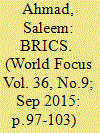

|
|
|
|
|
| Summary/Abstract |
The leaders of the BRICS countries have demonstrated that the establishment of the BRISC bank is a direct blow to the International financial system and it has also remarkably shown the building of the new global economic order that will bring middle economic powers to the global economic affairs. Things have changed rapidly, and the BRICS bank is going to play a pivotal role in financial policies of the developing countries. Moreover, the BRICS countries have indicated to the western countries and especially to the United States of America that nothing is permanent and gone are the days of American dollar; now they have their own currency for trade and exchange among the member countries. This step clearly shows a dent on American dollar hegemony in the world and China’s Yuan is going to rise gradually at the global level. Nevertheless, the fear of China’s dominance among its members can alter the new global economic order and BRICS countries should not give the opportunity to the western countries to play a “divide and rule policy” against its members. They must have faith in each other and can resolve their problems at the bilateral level as well as multi-lateral level.
|
|
|
|
|
|
|
|
|
|
|
|
|
|
|
|
| 2 |
ID:
095382
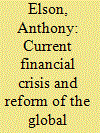

|
|
|
|
|
| Publication |
2010.
|
| Summary/Abstract |
The current financial crisis has sparked an active debate about the adequacy of the global financial architecture (GFA) or the collective governance arrangements for promoting the stability of the international financial system which are mainly centred in the operations of the Financial Stability Forum (now Board) and IMF. There are three areas in particular in which the governance arrangements for the GFA did not work effectively in the lead-up to the current crisis: the oversight of global financial system stability, the coordination of international financial regulation, and the provision of a lender of last resort mechanism. In the light of recent G20 decisions, proposals for reform in each of these areas need to be discussed.
|
|
|
|
|
|
|
|
|
|
|
|
|
|
|
|
| 3 |
ID:
077503
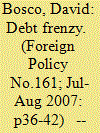

|
|
|
| 4 |
ID:
138205
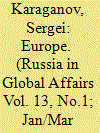

|
|
|
|
|
| Summary/Abstract |
Having won the Cold War (perhaps largely due to the courage of the Russian people who threw of a communist dictatorship and were prepared to take risks), Europe seems to be losing the peace. The region is entering the next stage of international relations disunited and weakened, and poised for a confrontation or maybe even a large-scale war. Wonderful slogans about "a common European home" (Mikhail Gorbachev), "A Europe whole and free" (George H.W. Bush), and the beginning of a "new era of democracy, peace, and unity" (the 1990 Charter of Paris for a New Europe) - all of which looked achievable twenty-five years ago - produce a sad smile today.
|
|
|
|
|
|
|
|
|
|
|
|
|
|
|
|
| 5 |
ID:
114983


|
|
|
|
|
| Publication |
2011.
|
| Summary/Abstract |
Norman Angell's The Great Illusion, which ran through six versions in London between November 1909 and December 1938, has some claim to have launched International Relations as a self-consciously independent yet sub-consciously liberal discipline. Understood to argue primarily that the interlocking fragility of the international financial system stopped modern states profiting from aggression, its ideas were promoted by a specially created foundation as 'the science of international politics' or 'international polity'. Since the 1970s, moreover, the book has been credited by scholars with pioneering the concepts of interdependence and globalisation. Now, therefore, it is less its seminal qualities than its fundamental flaws that require emphasis. Its celebrated claim about the irenic implications of financial interdependence was widely misunderstood as implying the impossibility, in addition to the disutility, of aggression. And a little-noticed second argument - that political control over territory brought no substantive benefits - was not only implausible but inconsistent with Angell's declared opposition to cuts in arms spending. The Great Illusion's policy recommendations were thus ambiguous, and altered from edition to edition as its author grappled first with the contradiction between pacifist and pro-defence strands in his thinking and then with the changing international situation.
|
|
|
|
|
|
|
|
|
|
|
|
|
|
|
|
| 6 |
ID:
086433
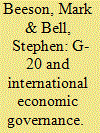

|
|
|
|
|
| Publication |
2009.
|
| Summary/Abstract |
Following the East Asian crisis of 1997-1998, much attention was paid to financial sector reform. While little of substance has changed in the intervening years, a number of potentially important new forums were established to facilitate international cooperation. By drawing on and modifying theories of hegemony, this article provides a theoretical context within which to explore one of these institutions: the Group of 20 (G-20). The key question examined is whether institutions like the G-20 are likely to provide genuine mechanisms for cooperation and inclusion or simply become instruments of "hegemonic incorporation." The argument here is that despite the continuing "structural" dominance of the international system by the United States and the Group of 7 (G7) nations, the G-20 provides some scope for other nations to influence outcomes.
|
|
|
|
|
|
|
|
|
|
|
|
|
|
|
|
| 7 |
ID:
099597


|
|
|
| 8 |
ID:
077029


|
|
|
|
|
| Publication |
2007.
|
| Summary/Abstract |
The massive growth of hedge funds has sparked warnings of instability and demands that the industry be regulated. But the fear of hedge funds is overblown, based on a misunderstanding of their role in the international financial system. In reality, hedge funds do not increase risk; they manage it -- and policymakers, rather than clamping down, should make sure hedge funds have the tools to perform this function well
|
|
|
|
|
|
|
|
|
|
|
|
|
|
|
|
| 9 |
ID:
089455


|
|
|
| 10 |
ID:
104015
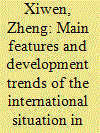

|
|
|
|
|
| Publication |
2010.
|
| Summary/Abstract |
In 2010, the underlying impact of the international financial crisis has further developed. The world economic recovery has been slow and tortuous. The momentum of collective rise of major emerging countries has strengthened. Reform of the international financial system has made progress. Interactions of the international relations are more complex. Traditional and non-traditional security threats are intertwined. Contentions among different development models have intensified. Asia has seen its status rising in spite of more destabilizing factors.
|
|
|
|
|
|
|
|
|
|
|
|
|
|
|
|
| 11 |
ID:
083856


|
|
|
| 12 |
ID:
102994
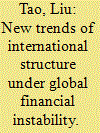

|
|
|
| 13 |
ID:
143553
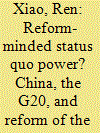

|
|
|
|
|
| Summary/Abstract |
This paper analyses the case of China in the G20 process and examines China’s position and policies on relevant issues, including international monetary system reform, reform of the international financial institutions (IFIs), international financial regulation, the future of the dollar, and internationalisation of the renminbi. My findings demonstrate that China has actively participated in the G20’s deliberations and actions, put forward its suggestions, sought an expanded share and voting power in the IFIs in correspondence with its rising status, and promoted the internationalisation of the renminbi. It does not aspire to overthrow this system within which it has prospered. In this sense China is a status quo power. Meanwhile China argues that the current international order is flawed and that there exist a number of unjust and unreasonable components. They have long needed to be changed. My conclusion is that China is not a complete but rather a reform-minded status quo power.
|
|
|
|
|
|
|
|
|
|
|
|
|
|
|
|
| 14 |
ID:
151219


|
|
|
|
|
| Summary/Abstract |
The admission by the International Monetary Fund (IMF) that it did not accurately estimate the damage that austerity will do to the Greek economy is yet another failure of the world body. It has admitted making similar mistakes in the past in handling economic crises in Mexico, Russia and Argentina. What was the exact nature of the Greek financial crisis? And how did the IMF handle this crisis? What were the Fund’s follies in its handling of the Greek crisis? Is there a pattern in the follies of the Fund in handling economic crises? If yes, then what does it tell us about the IMF and its governance of the world economy? This article seeks to answer these questions in the wake of long-pending reforms of the Fund’s governing structure and voting rights. Obviously, there is a need for more than just ‘fine-tuning’ of the Fund’s lending policies. Reforms such as expansion of the governing committee and increasing the quota share of developing countries are crucial for ‘re-imagining’ a stronger and more effective IMF that is more in tune with the changing global order of the twenty-first century. This article will take stock of the IMF quota and governance reforms initiated by the Fund in 2010 and review some other reform proposals that reflect the significant shifts in global economic power in the twenty-first century.
|
|
|
|
|
|
|
|
|
|
|
|
|
|
|
|
| 15 |
ID:
118930
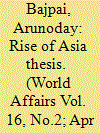

|
|
|
| 16 |
ID:
090526


|
|
|
|
|
| Publication |
2009.
|
| Summary/Abstract |
For years, oil wealth was mostly a danger to those, paradoxically, who possessed it. Resource-rich Middle Eastern countries, and their labor-exporting neighbors, failed for decades to invest adequately in their people or to diversify their economies.
|
|
|
|
|
|
|
|
|
|
|
|
|
|
|
|
| 17 |
ID:
089457
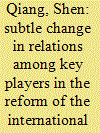

|
|
|